Abstract
A computerised self-assessment instrument was used to capture data on the distress caused by symptoms in 110 patients treated with radical radiotherapy. Patients selected symptoms from a list of 34 problems and then quantified the distress associated with each problem using a linear Analogue self assessment (LASA)-type scale. The test instrument was feasible: 90% of assessments were completed in under 14 min. There was a significant increase in tiredness and significant decrease in anxiety and worries about the family, during treatment. Menopausal symptoms and post-surgical problems were important causes of distress in the patients with breast cancer. When the area under the curve method was used to quantify distress in the patients with breast cancer, difficulty concentrating, pain and sleep disturbances emerged as significantly troublesome problems. Computerised self-assessment may have a useful role in quantifying the distress caused by treatment with radiotherapy.
Full text
PDF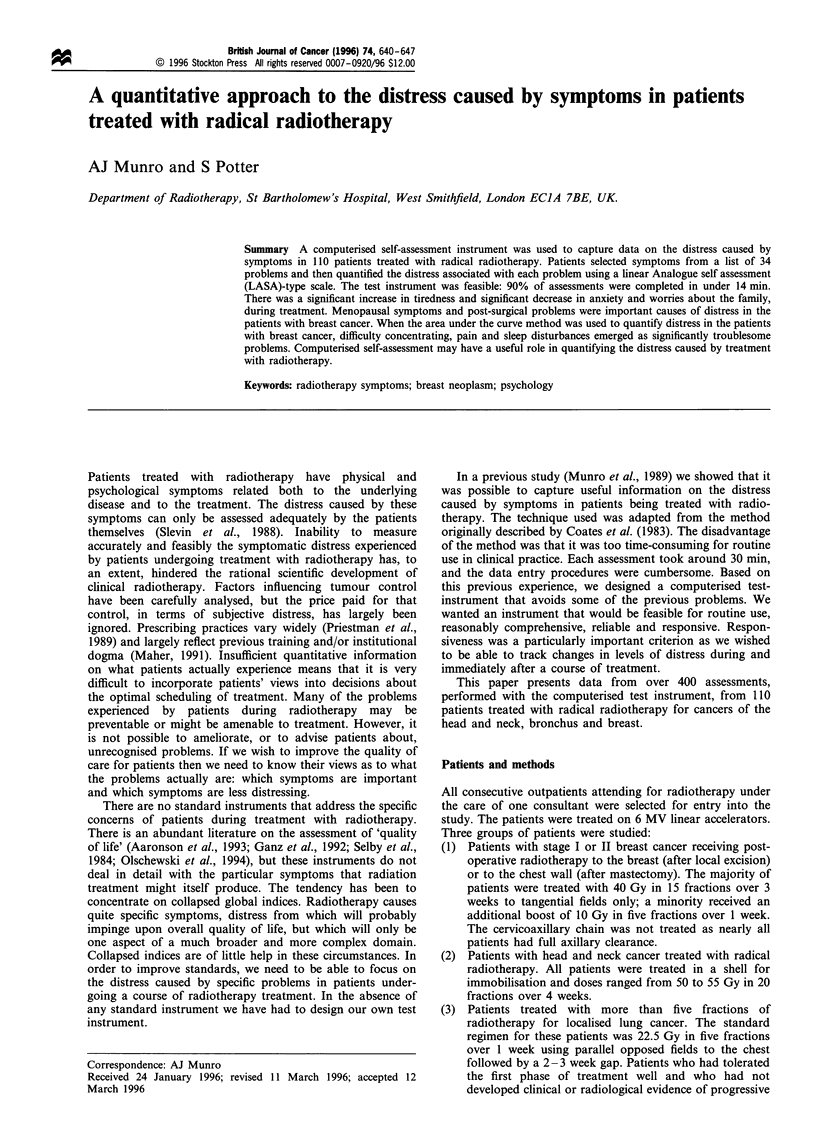
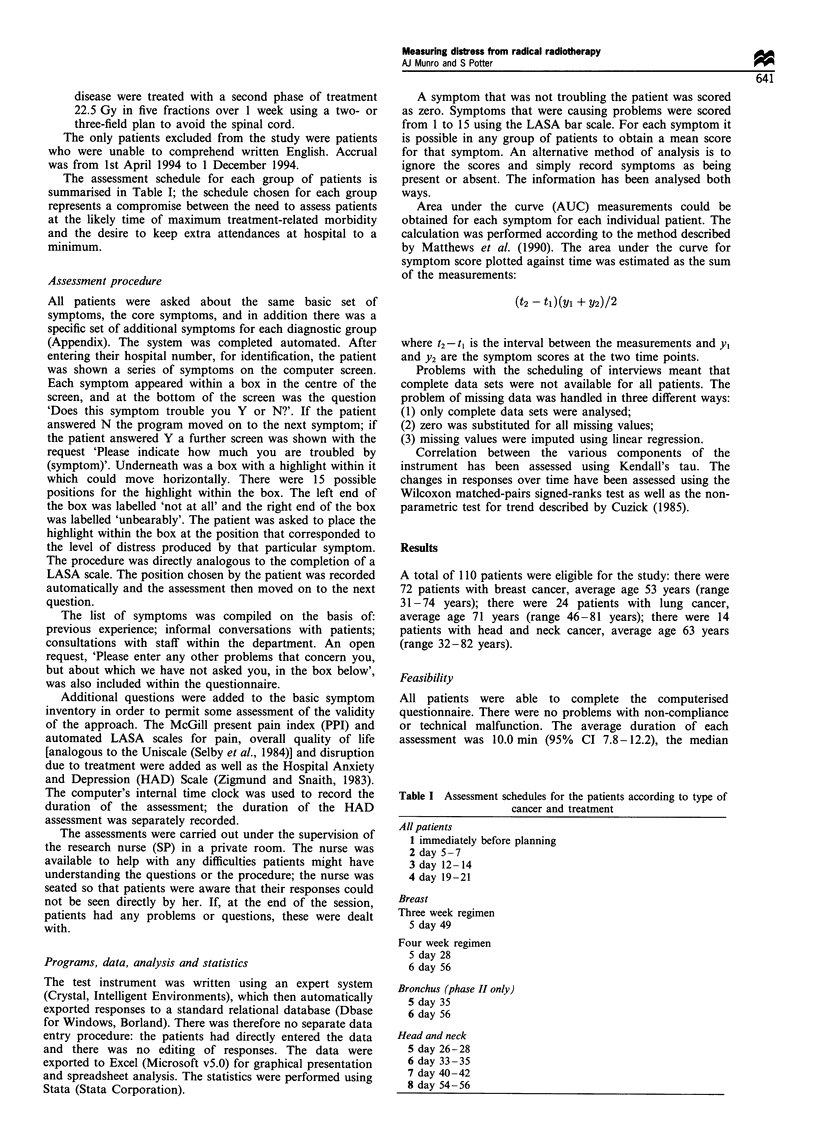
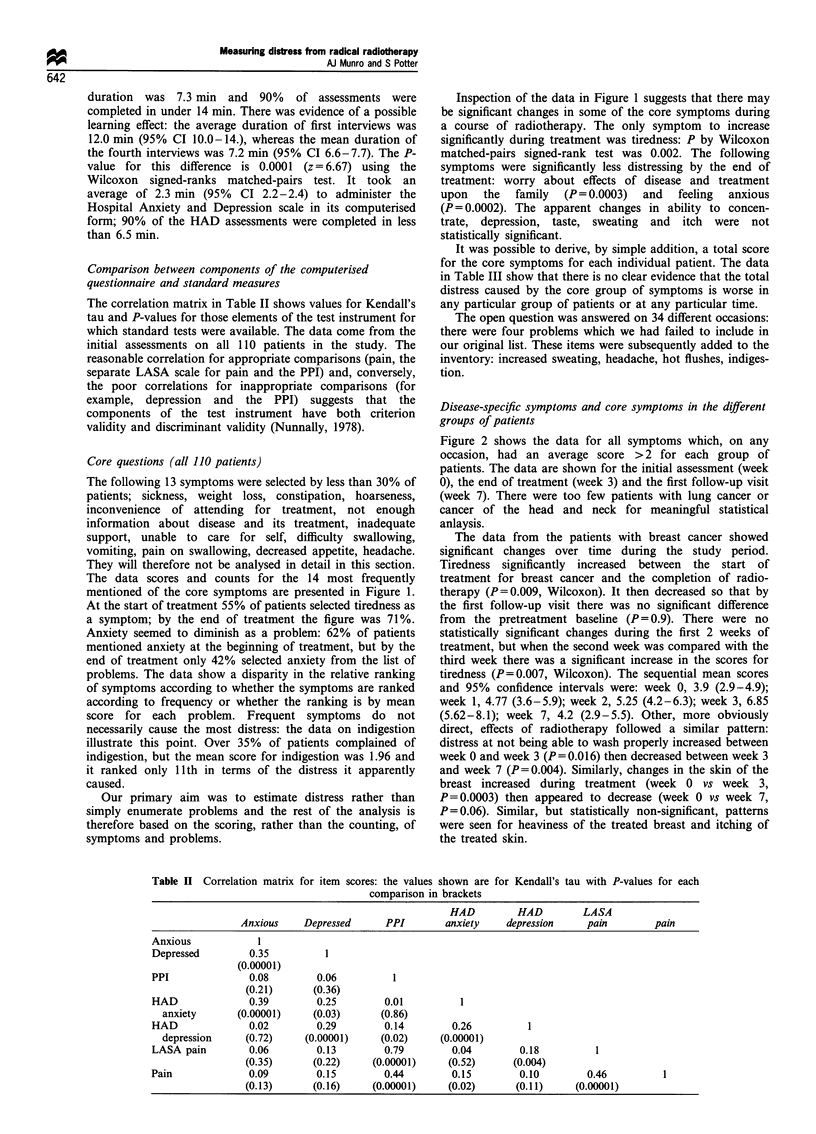
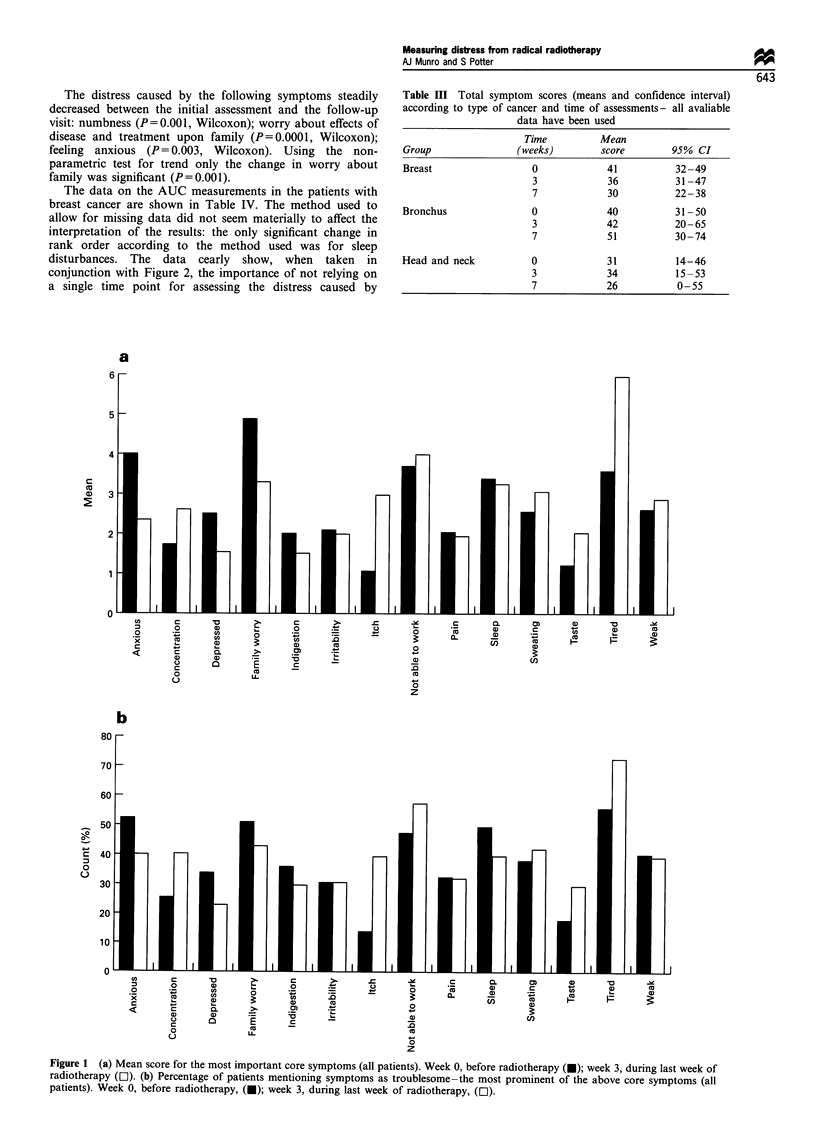
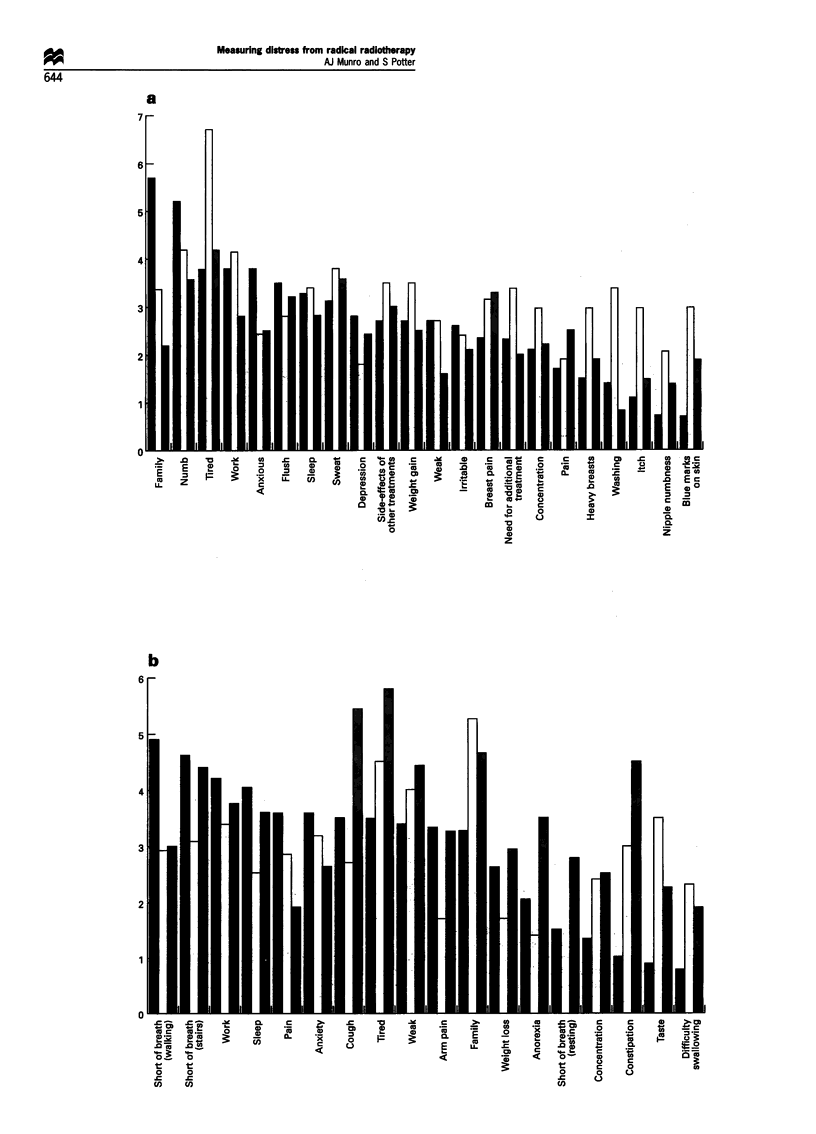
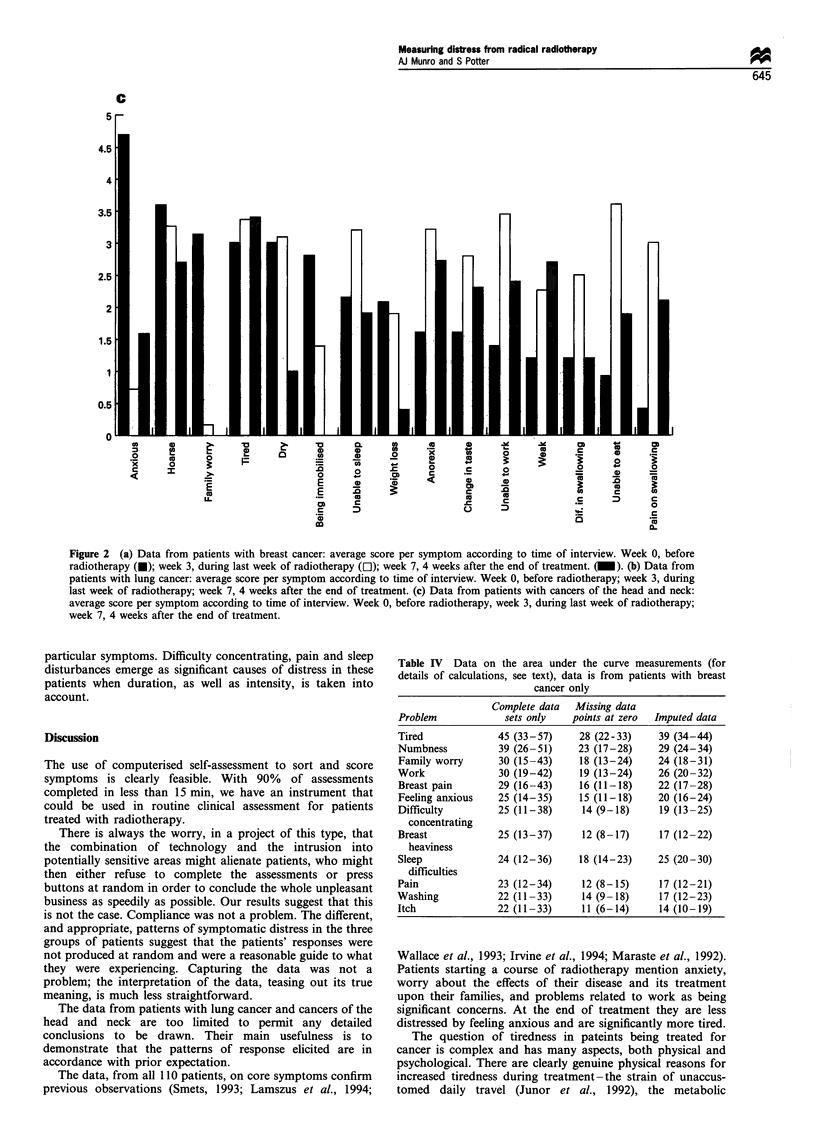
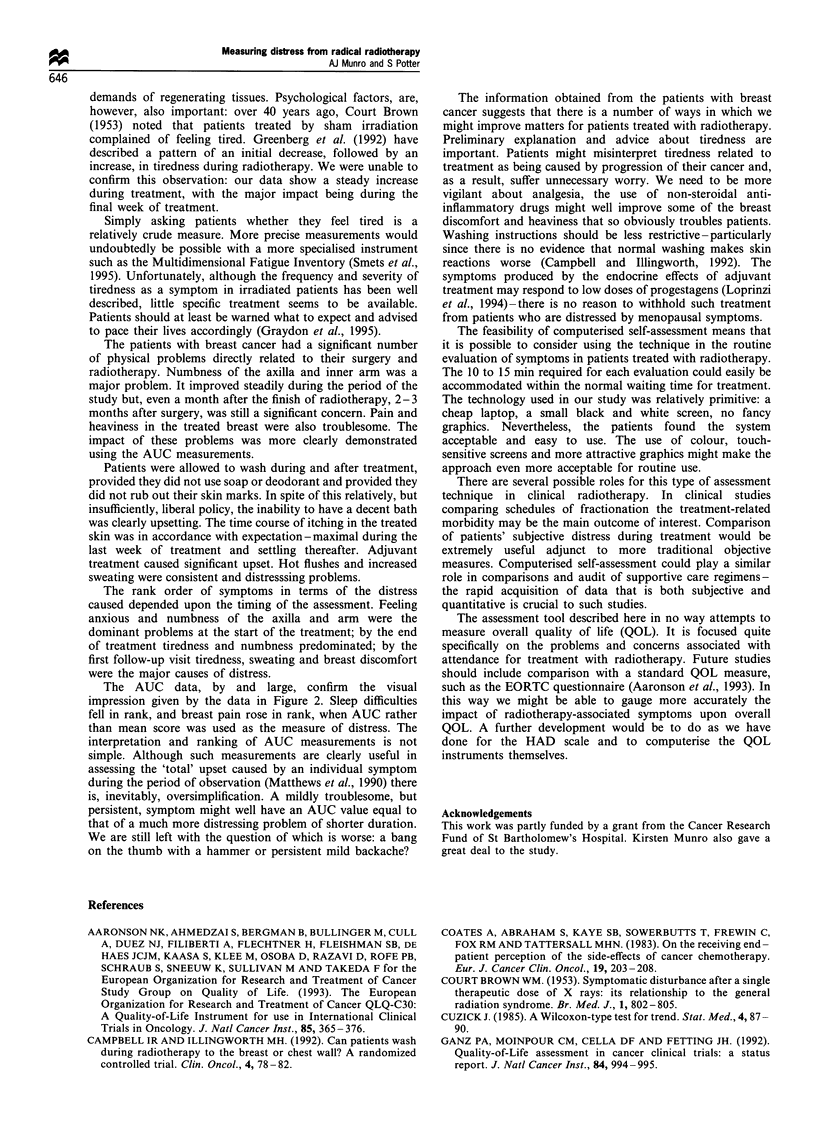
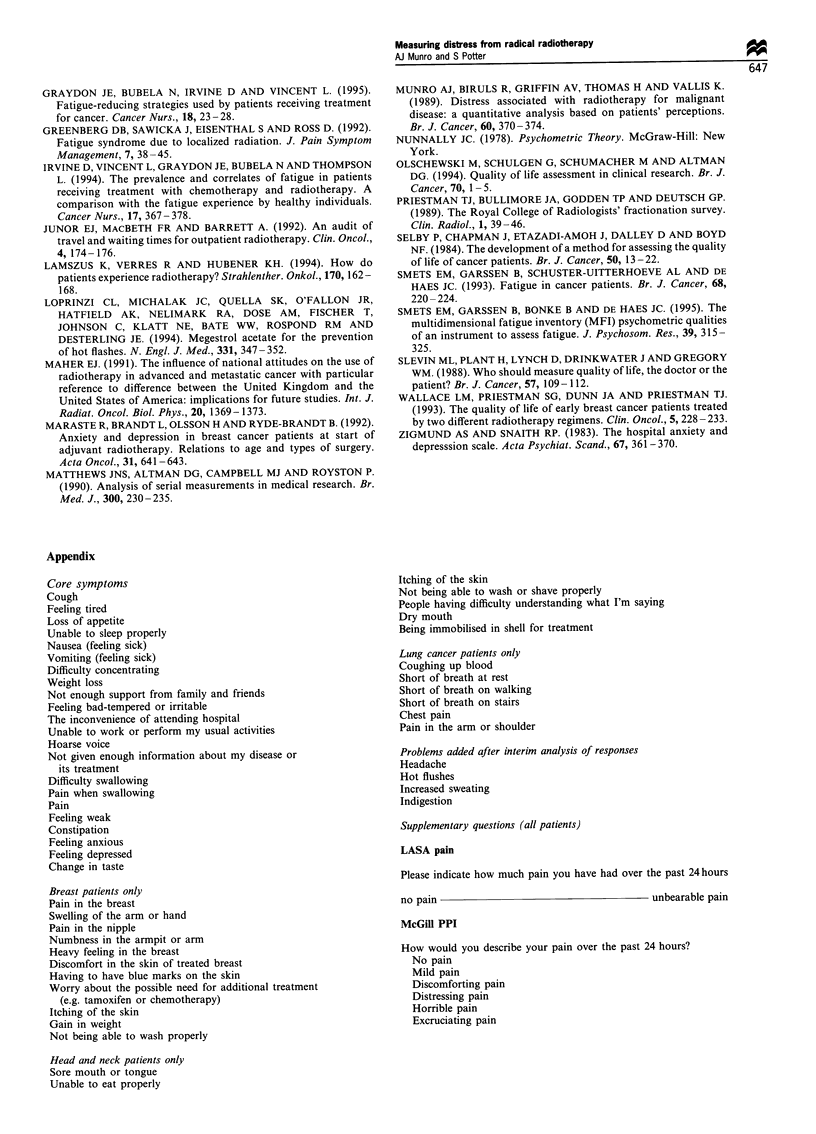
Selected References
These references are in PubMed. This may not be the complete list of references from this article.
- Aaronson N. K., Ahmedzai S., Bergman B., Bullinger M., Cull A., Duez N. J., Filiberti A., Flechtner H., Fleishman S. B., de Haes J. C. The European Organization for Research and Treatment of Cancer QLQ-C30: a quality-of-life instrument for use in international clinical trials in oncology. J Natl Cancer Inst. 1993 Mar 3;85(5):365–376. doi: 10.1093/jnci/85.5.365. [DOI] [PubMed] [Google Scholar]
- BROWN W. M. C. Symptomatic disturbance after single therapeutic dose of x rays; its relationship to the general radiation syndrome. Br Med J. 1953 Apr 11;1(4814):802–805. doi: 10.1136/bmj.1.4814.802. [DOI] [PMC free article] [PubMed] [Google Scholar]
- Campbell I. R., Illingworth M. H. Can patients wash during radiotherapy to the breast or chest wall? A randomized controlled trial. Clin Oncol (R Coll Radiol) 1992 Mar;4(2):78–82. doi: 10.1016/s0936-6555(05)80971-9. [DOI] [PubMed] [Google Scholar]
- Coates A., Abraham S., Kaye S. B., Sowerbutts T., Frewin C., Fox R. M., Tattersall M. H. On the receiving end--patient perception of the side-effects of cancer chemotherapy. Eur J Cancer Clin Oncol. 1983 Feb;19(2):203–208. doi: 10.1016/0277-5379(83)90418-2. [DOI] [PubMed] [Google Scholar]
- Ganz P. A., Moinpour C. M., Cella D. F., Fetting J. H. Quality-of-life assessment in cancer clinical trials: a status report. J Natl Cancer Inst. 1992 Jul 1;84(13):994–995. doi: 10.1093/jnci/84.13.994. [DOI] [PubMed] [Google Scholar]
- Graydon J. E., Bubela N., Irvine D., Vincent L. Fatigue-reducing strategies used by patients receiving treatment for cancer. Cancer Nurs. 1995 Feb;18(1):23–28. [PubMed] [Google Scholar]
- Greenberg D. B., Sawicka J., Eisenthal S., Ross D. Fatigue syndrome due to localized radiation. J Pain Symptom Manage. 1992 Jan;7(1):38–45. doi: 10.1016/0885-3924(92)90106-r. [DOI] [PubMed] [Google Scholar]
- Irvine D., Vincent L., Graydon J. E., Bubela N., Thompson L. The prevalence and correlates of fatigue in patients receiving treatment with chemotherapy and radiotherapy. A comparison with the fatigue experienced by healthy individuals. Cancer Nurs. 1994 Oct;17(5):367–378. [PubMed] [Google Scholar]
- Junor E. J., Macbeth F. R., Barrett A. An audit of travel and waiting times for outpatient radiotherapy. Clin Oncol (R Coll Radiol) 1992 May;4(3):174–176. doi: 10.1016/s0936-6555(05)81082-9. [DOI] [PubMed] [Google Scholar]
- Lamszus K., Verres R., Hübener K. H. Wie erleben Patienten die Strahlentherapie? Strahlenther Onkol. 1994 Mar;170(3):162–168. [PubMed] [Google Scholar]
- Loprinzi C. L., Michalak J. C., Quella S. K., O'Fallon J. R., Hatfield A. K., Nelimark R. A., Dose A. M., Fischer T., Johnson C., Klatt N. E. Megestrol acetate for the prevention of hot flashes. N Engl J Med. 1994 Aug 11;331(6):347–352. doi: 10.1056/NEJM199408113310602. [DOI] [PubMed] [Google Scholar]
- Maher E. J. The influence of national attitudes on the use of radiotherapy in advanced and metastatic cancer, with particular reference to differences between the United Kingdom and the United States of America: implications for future studies. Int J Radiat Oncol Biol Phys. 1991 Jun;20(6):1369–1373. doi: 10.1016/0360-3016(91)90251-x. [DOI] [PubMed] [Google Scholar]
- Maraste R., Brandt L., Olsson H., Ryde-Brandt B. Anxiety and depression in breast cancer patients at start of adjuvant radiotherapy. Relations to age and type of surgery. Acta Oncol. 1992;31(6):641–643. doi: 10.3109/02841869209083846. [DOI] [PubMed] [Google Scholar]
- Matthews J. N., Altman D. G., Campbell M. J., Royston P. Analysis of serial measurements in medical research. BMJ. 1990 Jan 27;300(6719):230–235. doi: 10.1136/bmj.300.6719.230. [DOI] [PMC free article] [PubMed] [Google Scholar]
- Munro A. J., Biruls R., Griffin A. V., Thomas H., Vallis K. A. Distress associated with radiotherapy for malignant disease: a quantitative analysis based on patients perceptions. Br J Cancer. 1989 Sep;60(3):370–374. doi: 10.1038/bjc.1989.287. [DOI] [PMC free article] [PubMed] [Google Scholar]
- Priestman T. J., Bullimore J. A., Godden T. P., Deutsch G. P. The Royal College of Radiologists' Fractionation Survey. Clin Oncol (R Coll Radiol) 1989 Sep;1(1):39–46. doi: 10.1016/s0936-6555(89)80010-x. [DOI] [PubMed] [Google Scholar]
- Selby P. J., Chapman J. A., Etazadi-Amoli J., Dalley D., Boyd N. F. The development of a method for assessing the quality of life of cancer patients. Br J Cancer. 1984 Jul;50(1):13–22. doi: 10.1038/bjc.1984.134. [DOI] [PMC free article] [PubMed] [Google Scholar]
- Slevin M. L., Plant H., Lynch D., Drinkwater J., Gregory W. M. Who should measure quality of life, the doctor or the patient? Br J Cancer. 1988 Jan;57(1):109–112. doi: 10.1038/bjc.1988.20. [DOI] [PMC free article] [PubMed] [Google Scholar]
- Smets E. M., Garssen B., Bonke B., De Haes J. C. The Multidimensional Fatigue Inventory (MFI) psychometric qualities of an instrument to assess fatigue. J Psychosom Res. 1995 Apr;39(3):315–325. doi: 10.1016/0022-3999(94)00125-o. [DOI] [PubMed] [Google Scholar]
- Smets E. M., Garssen B., Schuster-Uitterhoeve A. L., de Haes J. C. Fatigue in cancer patients. Br J Cancer. 1993 Aug;68(2):220–224. doi: 10.1038/bjc.1993.319. [DOI] [PMC free article] [PubMed] [Google Scholar]
- Wallace L. M., Priestman S. G., Dunn J. A., Priestman T. J. The quality of life of early breast cancer patients treated by two different radiotherapy regimens. Clin Oncol (R Coll Radiol) 1993;5(4):228–233. doi: 10.1016/s0936-6555(05)80234-1. [DOI] [PubMed] [Google Scholar]
- Zigmond A. S., Snaith R. P. The hospital anxiety and depression scale. Acta Psychiatr Scand. 1983 Jun;67(6):361–370. doi: 10.1111/j.1600-0447.1983.tb09716.x. [DOI] [PubMed] [Google Scholar]


